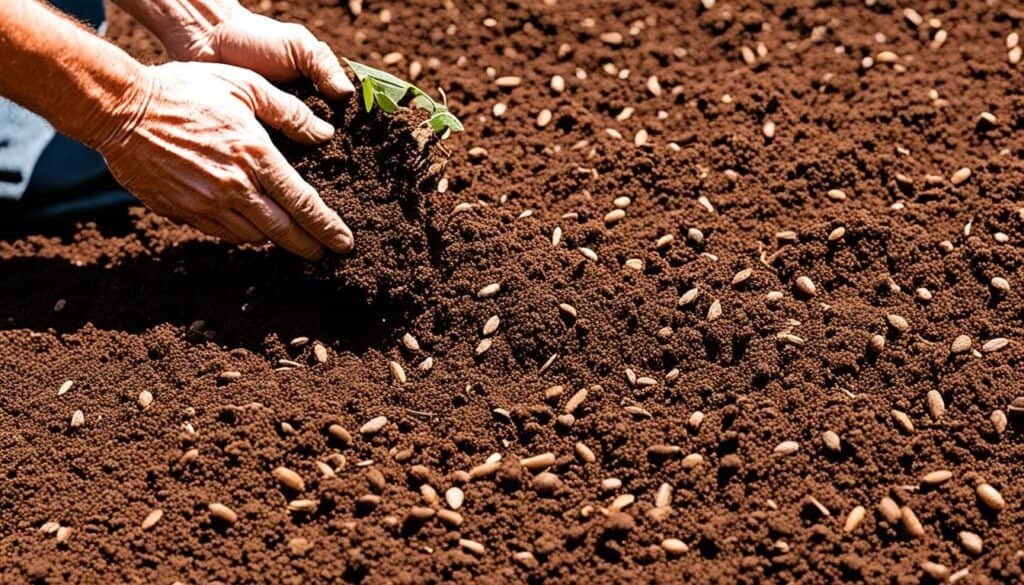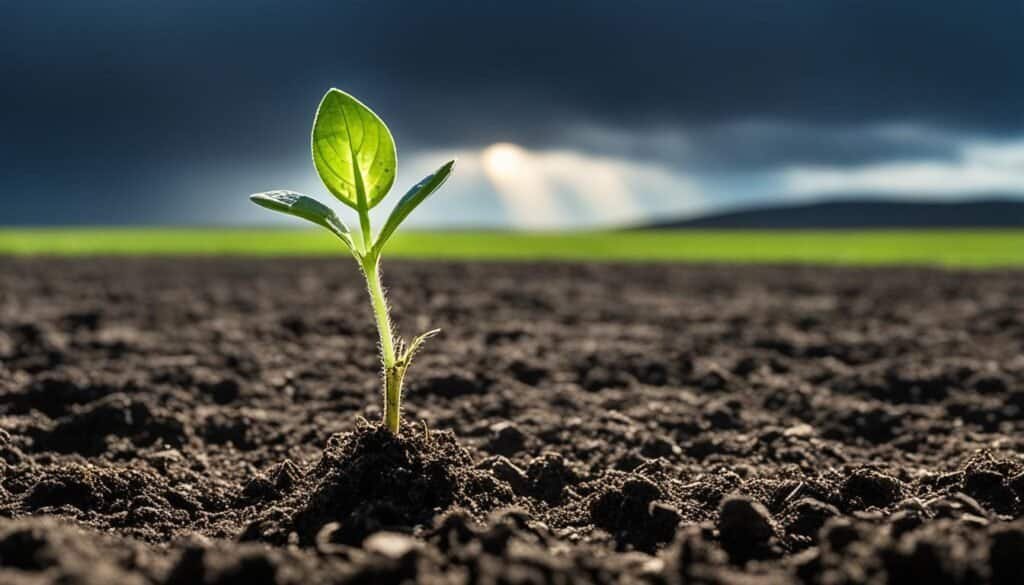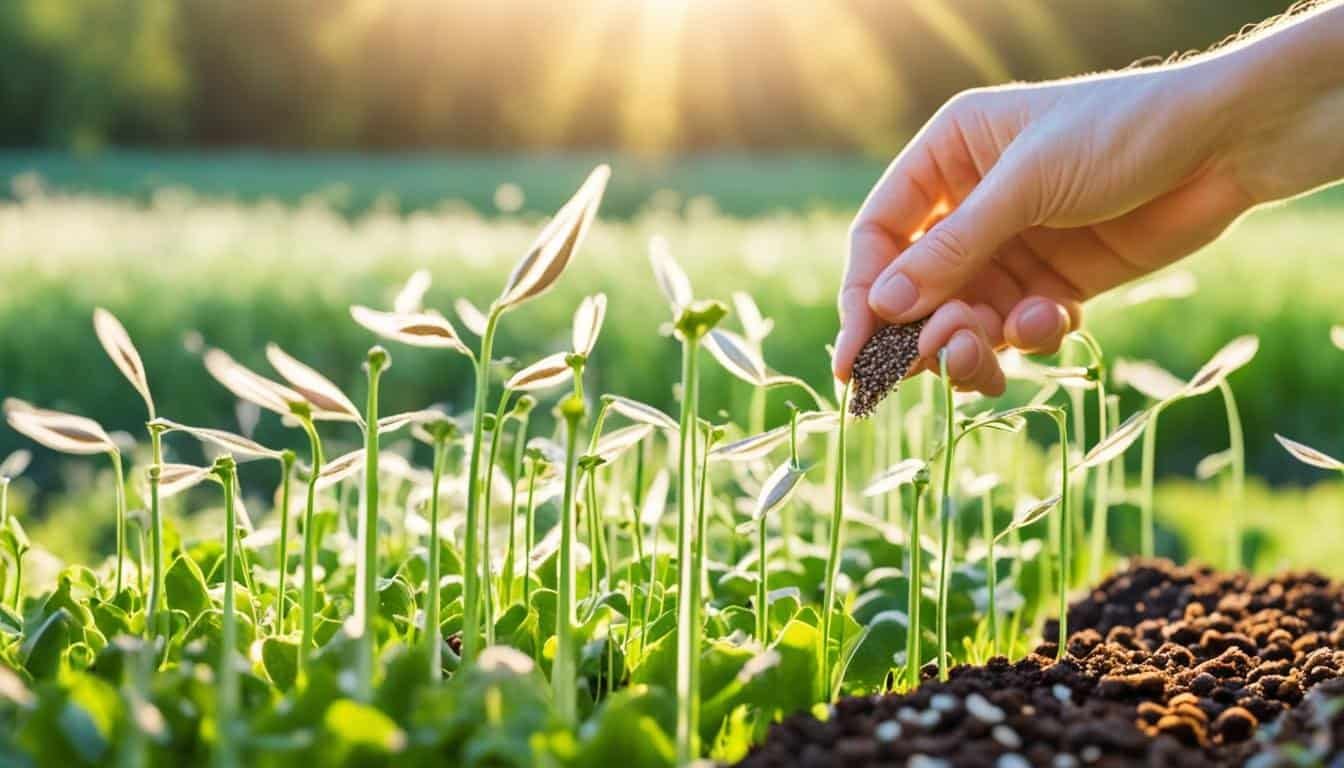Have you ever wondered how the Kingdom of Heaven is like a sower who plants seeds? What is the deeper meaning behind this metaphor? In this article, we will unravel the wisdom embedded in Jesus’ parable and explore how it relates to our spiritual journey. Prepare to be enlightened and inspired as we delve into the profound message conveyed by this analogy.
Key Takeaways
- Jesus used the parable of the sower to convey the profound messages about the Kingdom of Heaven.
- The parable emphasizes the potential for tremendous growth that originates from small beginnings.
- A receptive heart plays a vital role in our spiritual growth, resembling fertile soil that nurtures and embraces God’s teachings.
- The parable highlights the importance of resilience in the face of challenges, drawing parallels between the obstacles faced by seeds and our own journey.
- Growth in the Kingdom of Heaven is mysterious and unfolds in unseen ways, reflecting the evolving nature of our faith.
Unexpected Growth from Tiny Beginnings
Have you ever marveled at the unexpected growth that can come from the tiniest of beginnings? It’s fascinating how a small seed, when given the right conditions, can grow into a towering tree that provides shade, shelter, and beauty.
Similarly, in the parable of the sower, Jesus compares the Kingdom of Heaven to a small seed that has the potential to grow into something magnificent. Just like a seed, the Kingdom starts with humble beginnings and flourishes through the impact of little deeds.
“Truly I tell you, if you have faith as small as a mustard seed, you can say to this mountain, ‘Move from here to there,’ and it will move. Nothing will be impossible for you.”
Just as a mustard seed grows into a large tree, our faith and acts of kindness have the power to create a significant impact. It’s through the small acts of love, compassion, and generosity that the Kingdom of Heaven is revealed in our lives and in the world around us.
Think about it – a smile, a helping hand, a comforting word – these seemingly insignificant gestures can plant seeds of hope and healing in someone’s heart. And just like the mustard seed, these small acts of kindness can grow into something greater, influencing the lives of others in ways we may never fully comprehend.
In the Kingdom of Heaven, even the smallest acts have the potential to make a big difference. The impact of your little deeds ripples through the lives of others, creating a wave of love, compassion, and transformation. So, let us remember that it is within our power to sow these seeds of kindness and contribute to the growth of the Kingdom.
In the next section, we will explore the importance of having a receptive heart, much like the fertile soil in the parable of the sower. We will reflect on the different types of soil and how they relate to our spiritual growth. So, join us as we delve into the mysteries of the parable and uncover the lessons it holds for our lives.
Table: Seeds of Growth
| Seed | Conditions for Growth | Result |
|---|---|---|
| Mustard Seed | Adequate water, soil, and sunlight | A large tree providing shade and shelter |
| Acknowledgment of Others | Acts of kindness and compassion | Transformation of lives |
| Seeds of Love | Expressions of love and care | A ripple effect of love and unity |
The Importance of a Receptive Heart
In the parable of the sower, Jesus used the metaphor of different types of soil to illustrate the significance of a receptive heart in our spiritual growth. Just as different soils produce varied outcomes for the seeds sown, our hearts’ condition has a profound impact on our ability to embrace and nurture God’s teachings.
When our hearts act as receptive receptors, we become fertile ground for spiritual growth. The receptors in our hearts amplify the message of God’s love and grace. Just as the receptor cells in our bodies are vital for transmitting signals, our hearts’ receptors enable us to absorb and internalize divine teachings and wisdom.
Similar to the various types of soil mentioned in the parable, our hearts can be likened to different receptivity levels. Let’s explore the different types of soil and how they relate to our spiritual journey:
- Hardened Soil:
Just as hardened soil cannot nourish and support seeds, a hardened heart fails to receive and embrace God’s teachings. It is resistant and closed off, inhibiting spiritual growth. Cultivating a receptive heart requires humility and a willingness to let go of ego and pride. - Shallow Soil:
Shallow soil may initially receive the seed, but because it lacks depth, the roots cannot establish a firm foundation. Similarly, a superficial heart may show temporary enthusiasm for God’s teachings but lacks the depth of understanding and commitment required for enduring spiritual growth. - Thorny Soil:
Thorny soil represents a heart preoccupied by worldly pleasures and distractions, such as materialism and selfish desires. These thorns choke the growth of the seed, hindering the spiritual journey. To cultivate a fertile heart, we must be vigilant in removing the thorns of worldly attachment and wholeheartedly prioritize our relationship with God. - Fertile Soil:
Fertile soil is rich, nourishing, and conducive to growth. In the same way, a receptive heart readily embraces and nurtures God’s teachings, enabling spiritual growth to flourish. To cultivate a fertile heart, we must actively seek opportunities for spiritual nourishment, such as studying scripture, engaging in prayer and meditation, and participating in acts of kindness and service.
As we cultivate a heart like fertile soil, we open ourselves to the transformative power of God’s teachings. Embracing and nurturing God’s teachings allows us to grow and flourish in our spiritual journey, just as seeds thrive in fertile soil.
| Soil Type | Characteristics | Receptivity to Spiritual Growth |
|---|---|---|
| Hardened Soil | Compacted and resistant | Lowest receptivity |
| Shallow Soil | Lacks depth and firm foundation | Some initial reception, but limited growth |
| Thorny Soil | Preoccupied by worldly distractions | Hindered by competing desires |
| Fertile Soil | Rich, nourishing, and conducive to growth | Optimal receptivity for spiritual growth |
Just as farmers diligently cultivate and care for their soil to yield a bountiful harvest, we too must tend to the condition of our hearts to experience the abundant rewards of a flourishing spiritual life. By embracing God’s teachings with a receptive heart, we create the ideal environment for our spiritual growth to thrive.

Resilience Amidst Challenges
In this section, we will explore the theme of resilience in the parable of the sower and how it relates to our own spiritual journey. Just like the seeds face obstacles such as rocky soil and thorns, we too encounter challenges in life that test our faith. However, it is through these challenges that we learn to cultivate resilience, finding strength to overcome and grow.
When seeds encounter rocky soil, their roots struggle to find stability and nourishment. Similarly, in our own lives, we often face unexpected hurdles that shake our foundation. But it is during these times of adversity that we can choose to dig deeper, anchoring ourselves in the unwavering faith that sustains us.
“The greater the obstacle, the more glory in overcoming it.” – Moliere
Just as seeds must push through the thorns that threaten to choke their growth, obstacles in our spiritual journey can feel overwhelming. However, it is in these moments that our faith is tested, and our steadfastness shines through. Embracing the challenges with courage and determination, we can rise above the thorns, knowing that they are temporary barriers on our path to growth and spiritual maturity.
Resilience is not just about bouncing back from setbacks, but also about finding strength in the face of adversity. It is a quality that enables us to navigate the twists and turns of life’s journey, staying rooted in our faith even when circumstances seem daunting.
Just as the seeds embody the resilience to push through obstacles, we too can find the inner strength to persevere. Our challenges can become catalysts for growth, teaching us valuable lessons about endurance, trust, and reliance on a Higher Power.
In the table below, we highlight some of the obstacles faced by seeds in the parable, drawing parallels to the challenges we encounter in our spiritual journey:
| Obstacles Faced by Seeds | Challenges in Our Spiritual Journey |
|---|---|
| Rocky Soil | Uncertainty and instability |
| Thorns | Distractions and temptations |
| Hardened Ground | Resistance to change |
Understanding that challenges are inevitable in our spiritual journey, we can approach them with resilience, knowing that they are opportunities for growth and transformation. It is during these trying times that our character is forged, and our faith deepens. Just as seeds overcome their obstacles to bloom and bear fruit, we too can emerge stronger, wiser, and more steadfast on our path to spiritual fulfillment.
The Mystery of Growth
In the parable of the sower, Jesus uses the metaphor of seeds growing to illustrate the unfolding of the Kingdom of Heaven in our lives. Just as seeds grow in mysterious and unseen ways, our faith evolves and grows in ways that may go unnoticed. It is in these unseen moments that the Kingdom of Heaven is quietly unfolding within us.
When we plant seeds, we can’t see the growth happening beneath the surface. The same applies to our evolving faith. Sometimes, we may feel stagnant or unsure of our progress, but just like the seeds, our faith is growing and developing in ways we may not fully comprehend.

We can find comfort in the mysterious nature of growth. It reminds us that even when we can’t see the progress, something beautiful is happening within us. Our faith is deepening, our understanding is expanding, and our connection to the Kingdom of Heaven is unfolding in ways that may surprise us.
As we navigate our spiritual journey, it is important to trust in the unseen. Just as seeds grow through the combination of sunlight, water, and nutrients, our faith flourishes through prayer, scripture, and the guidance of the Holy Spirit. These unseen elements nourish our souls and contribute to the flourishing of our evolving faith.
So let us embrace the mystery of growth, knowing that the unfolding of the Kingdom of Heaven is continuously at work in our lives. Let us nurture our faith by staying connected to God’s teachings, by prayerfully seeking wisdom, and by remaining open to the unseen ways in which our faith is evolving.
How is the concept of the Kingdom of Heaven portrayed in the parable of the sower planting seeds?
In the parable of the sower planting seeds, the concept of exploring the kingdom of heaven is portrayed as seeds being sown in different types of soil, symbolizing different responses to the word of God. The seeds that fall on good soil represent those who fully embrace and understand the kingdom of heaven.
The Harvest is Coming
In the journey of faith, we plant seeds with the hope of a bountiful harvest. Just as a farmer tills the soil, sows the seeds, and patiently waits for the crops to grow, we too must persevere in living a life of faith, knowing that the reward of our harvest is on its way.
Living a life of faith requires steadfastness and perseverance. Like the seeds that face various challenges, such as rocky soil and thorns, we also encounter obstacles along our spiritual journey. However, it is through these challenges that our faith is tested and strengthened, preparing us for the abundant harvest that awaits.
As we remain faithful to God’s teachings and nourish our hearts with His love and grace, we can envision the bountiful harvest that is coming. Our perseverance in faith will bear fruit, and the rewards will be even greater than we could have imagined. So let us continue to sow seeds of kindness, cultivate a receptive heart, and trust in the unseen growth that is happening within us, knowing that the harvest is near.
Affiliate Disclosure: "As an Amazon Associate I earn from qualifying purchases made from links in this post. We are a participant in the Amazon Services LLC Associates Program, an affiliate advertising program designed to provide a means for us to earn fees by linking to Amazon.com."

